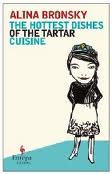The story: In a Russian city located many hours away from Moscow by train, Rosalinda Achmetowna lives with her dejected husband Kalganow and her “deformed” daughter Sulfia. It is 1978. They share the communal apartment with a woman named Klavdia. Rosa begins the tale of her adulthood through the end of the 20th century:
 As my daughter Sulfia was explaining that she was pregnant but that she didn’t know by whom, I paid extra attention to my posture. I sat with my back perfectly straight and folded my hands elegantly on my lap.
As my daughter Sulfia was explaining that she was pregnant but that she didn’t know by whom, I paid extra attention to my posture. I sat with my back perfectly straight and folded my hands elegantly on my lap.
Sulfia was sitting on a kitchen stool. Her shoulders were scrunched up and her eyes were red; instead of simply letting her tears flow she insisted on rubbing them into her face with the backs of her hands. This despite the fact that when she was still a child I had taught her how to cry without making herself look ugly, and how to smile without promising too much.
But Sulfia wasn’t very gifted. In fact, to be honest, I’d say she was rather stupid. And yet somehow she was my daughter – worse still, my only daughter .
Rosa briskly establishes the terms of her relationship to the reader and never lets up. An outsize character by way of both her dominating personality and self-regard, Rosie’s tone never falters: confident, inflexible, disparaging. She assumes her listeners either share her opinions or will simply give in to them. She is the prime mover of her world’s action – despite the bleak backdrop of the USSR in decay (on page two, anthrax spores leak out from a city lab). By page three, Rosa and Klavdia attempt to abort Sulfia’s fetus with a hot bath of mustard power. When this technique fails, they revert to a knitting needle. But the child is born. The grandmother names her Aminat after her Tartar mother. In fact, Rosie is determined to rear the child herself.
 This hardly sounds like the makings of comedy, nor would it seem likely that we would empathize, much less identify, with the cunning, headstrong, and often hurtful Rosa. She is unchangeable – a character who experiences no epiphanies and doesn’t “develop” (thus making her potentially distasteful and alarming to the average college-educated American novel reader desperate to depend on such improbable evolutions).
This hardly sounds like the makings of comedy, nor would it seem likely that we would empathize, much less identify, with the cunning, headstrong, and often hurtful Rosa. She is unchangeable – a character who experiences no epiphanies and doesn’t “develop” (thus making her potentially distasteful and alarming to the average college-educated American novel reader desperate to depend on such improbable evolutions).
But this is the surprise of Alina Bronsky’s second novel, The Hottest Dishes of the Tartar Cuisine. The stuff of caricature hardens into the persistence of character. As an anti-heroine, Rosa plots her way out of Soviet Russia, a hard-working survivor in an unsteady world. On the one hand, she is untroubled by self-awareness (she is deluded) and at least as sane as the times she lives in (thus possibly mad). On the other hand, she is an indomitable force with unbounded, misplaced affections. She is vain, proud, and profane.
When Sulfia tries to escape her mother’s clutches with Aminat, Rosa responds with diabolical efficiency:
It was important to me that Sulfia not sneak off with her again. So I told the kindergarten principal that Aminat’s mother had sustained brain damage and was no longer allowed to look after Aminat on her own. The principal wanted to see some sort of certification from a doctor. I went to our live in neighbor Klavdia. She got me papers certifying that as a result of an insect bite, Sulfia had difficulties with routine tasks, adding that anyone who came into contact with her was obligated to offer help. This doctor’s certificate was pure gold; from then on, everyone avoided coming anywhere near her.
 Bronsky introduced herself to American readers in a recent New York Times interview. Regarding her comedic impulse, she said, “Sometimes I do readings and people can’t stop laughing, but I’m reading about pretty tragic things. I think Soviet humor is a desperate humor, rather typical of very different nations, of Jewish people, Ukrainians, and of course, Russians. It’s despair — just keep laughing, until you are dead.”
Bronsky introduced herself to American readers in a recent New York Times interview. Regarding her comedic impulse, she said, “Sometimes I do readings and people can’t stop laughing, but I’m reading about pretty tragic things. I think Soviet humor is a desperate humor, rather typical of very different nations, of Jewish people, Ukrainians, and of course, Russians. It’s despair — just keep laughing, until you are dead.”
Born in 1978 in Sverdlovsky (now Yekaterinburg) below the Urals, Bronsky and her family moved to Germany in 1990 when her father, a scientist, was invited to work there. The collapse of regimes, the demolition of closed borders, and the relocation of peoples all rumble in the background of Bronsky’s writing. In The Hottest Dishes of the Tartar Cuisine, Rosie’s intrusive maneuvers to sustain her livelihood and Aminat’s future lead to her family’s migration to Germany. But before this happens in the late 1980s, Rosa, Sulfia and Aminat pass through several harsh and heartbreaking episodes:
During the initial period without my husband, I filled the empty hours with thoughts. I thought a lot. I conducted a thorough evaluation of my life. It was clear that not everything had gone smoothly. But I had always made the best out of every situation. In my late twenties, for instance, I had to get a new passport because my old one had been stolen. For that I needed my birth certificate, which I no longer had. The orphanage where I had spent the bulk of my childhood had burned down, and all the records destroyed. The passport-issuing authority had to take my word – so I made myself seven years younger, which seemed about right for me anyway.
I had always tried to make up for the failures of others, whether through advice, action, or my own good will. That’s a notoriously thankless job.
Such is her “thorough evaluation.” The Tartar element in Rosa is her contrary, impetuous mien – but she has resisted passing on the Tartar traditions to her family. The hottest Tartar dish in the novel is Rosa herself (after her husband departs, she methodically goes about taking appropriate men to her bed). She scorches most everyone she comes in contact with. But her tersely reductive evaluation of people and situations has a comedic, dark authenticity. In the passage below, she talks about her dedication to Aminat’s upbringing:
Each day after kindergarten I talked to her about how her day had been, correcting her grammar as we spoke and trying to expand her vocabulary.
”Electricity, my dear,” I told her when she tried to stick a nail file in an outlet.
”Communism, my dear,” I said when I managed to get hold of a bunch of bananas for her and let them ripen on the windowsill, giving her just one each day so they’d last for awhile.
”Gravity, my dear,” I told her when she fell down yet again. It happened often; Aminat was incredibly clumsy during her first few years.
 Whatever exceeds tough love is the treatment the browbeaten Sulfia gets from her mother. The unfolding results are hard to take as the plot hustles onward. And perhaps this is Bronsky’s ultimate effect on the reader: distress relieved only by grim humor. Why should we experience this? To know this comfortless world and what someone like Rosie will tell herself and do to exert some control over it. To be entertained by the disdain of our expectations. In Rosalinda Achmetowna, Alina Bronsky has created one of the most memorable characters in recent fiction.
Whatever exceeds tough love is the treatment the browbeaten Sulfia gets from her mother. The unfolding results are hard to take as the plot hustles onward. And perhaps this is Bronsky’s ultimate effect on the reader: distress relieved only by grim humor. Why should we experience this? To know this comfortless world and what someone like Rosie will tell herself and do to exert some control over it. To be entertained by the disdain of our expectations. In Rosalinda Achmetowna, Alina Bronsky has created one of the most memorable characters in recent fiction.
[Published by Europa Editions on May 2, 2011. 246 pages, paperback original. Bronsky’s first novel, Broken Glass Park, also available from Europa Editions, won the Ingeborg Bachmann Prize, one of Europe’s most prestigious literary awards]